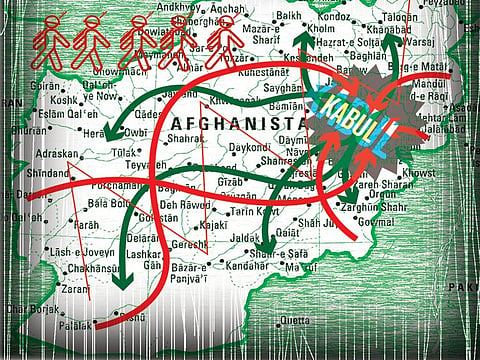Pakistan’s regional connectivity plans hinge on Afghanistan peace
At the end of the day Afghans have to find their own formula to maintain stability

Pakistani officials are in top-gear trying to manage the complex situation that is emerging out of Afghanistan. The Pakistani Prime Minister, Imran Khan along with intelligence top brass was in Uzbekistan recently to attend the Central and South Asia Regional Connectivity Conference where a large part of the engagements focused on Afghanistan.
This is to be followed by a three-day peace conference in Islamabad in the next few weeks where the government has invited most of Afghanistan’s stakeholders. The conference initially scheduled to be held this week has been postponed till after Eid Al Adha.
Top ranking security officials in wide-ranging interviews explained to the Gulf News the reasons behind this new diplomatic spurt.
Full potential of regional trade
“There are many reasons. but the first and foremost is that Pakistan has a vested interest in seeing Afghanistan settle down so that the full potential of regional trade and commerce can be exploited. Without Afghanistan peace, all plans of regional connectivity will remain elusive”, the official said on condition of anonymity. Pakistan has myriad gas pipelines and road connectivity projects on the table but the situation in Afghanistan has kept all of them in cold storage.
“Regional connectivity is to everyone’s benefit. We want to be a hub of trade and commerce, a pathway for goods and services to move freely from the Horn of Africa to the heart of the Middle East and Europe. If there is one country that benefits from peace after Afghanistan it is Pakistan”, said the official.
That makes sense. As it is, the uncertainty in Afghanistan’s north and west has halted even existing trade links. Pakistan’s border with Afghanistan is now closed and thousands of goods-laden transport vehicles are waiting to be cleared. The more the situation worsens, the longer the borders would remain closed and the greater the loss of revenue.
There are other factors at work in Pakistan’s attempts to somehow create a middle-ground for Afghanistan’s stakeholders to work out a negotiated settlement quickly.
No military solution
“There is no military solution to the problem. No one faction can win the conflict regardless of how powerful they are. The Taliban have a clear advantage since they already control 55% of the territory but this does not mean that the conflict can end on any one group’s terms. The solution has to be Afghan-owned and Afghan-led and we can facilitate the process to the extent we can,” Pakistani officials note.
They are quick to point out that Pakistan is not a peace guarantor. “We don’t have a peace plan. It cannot be our plan at any rate since at the end of the day Afghans have to find their own formula.”
Pakistan is also apprehensive of violence spillover and security officials are eager to mention how crucial the border fencing efforts are to protecting the western side of Pakistan’s territory. They say that almost 70 per cent of the border is already fenced with 400 forts being built additionally. Out of these 250 are already functioning.
“If conflict lingers on, there can be an influx of new refugees, almost 700,000 plus can come our way. We can’t afford that”, say officials.
Pakistan already had tough time returning the refugees that had come to the country in the earlier exodus caused by the conflicts in the 80s and then post 9/11. Pakistani policymakers are convinced that the best way to treat the new wave of refugees will be to keep them close to the border as “externally displaced persons” without giving them the status of refugees.
“Formal refugee status is problematic since we are now locked in a tough diplomatic situation with the international community that insists that the existing refugees should only be returned “voluntarily”. We tell them no one will return voluntarily because of the situation there.”
Prolonged conflict and displaced persons in their thousands augur ill for Pakistan as long stretches of land become inhabitant belts for troublemakers and terror groups.
We want to be the beneficiaries of our geography and not victims and Afghanistan’s peace is crucial in deciding which of the two it is going to be,” say officials. That indeed is true.
Syed Talat Hussain is a prominent Pakistani journalist and writer. Twitter: @TalatHussain12







